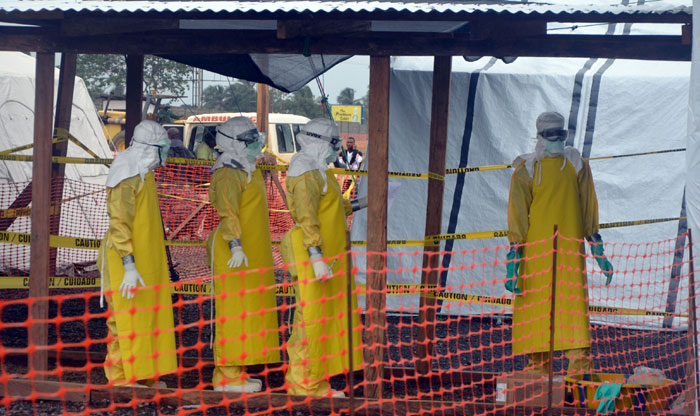Staff members prepare to handle Ebola cases at the Elwa hospital in Monrovia. Liberia has seen the biggest toll among the four west African countries hit by Ebola, with 576 deaths from 972 diagnosed cases to date.
AFP
Every region of Liberia has now been hit by Ebola, officials said on Friday, as other affected west African nations scrambled to contain the spread of the killer virus.
After seeing people fall to the deadly disease in area after area, Liberia said two people had succumbed to the virus in Sinoe province, the last Ebola-free bastion in a country that has seen the biggest toll with 576 deaths.
The virus has spread relentlessly through Liberia, Guinea and Sierra Leone over the past months, killing 1,350 people since March, and Nigeria has also been affected despite showing some progress in fighting the epidemic.
"(Sinoe) was the last area untouched by Ebola," George Williams, head of the Health Workers Association of Liberia, said.
The country has witnessed chaotic scenes in recent days following a surge in the number of patients dying of the haemorrhagic fever.
Aid workers said crematoriums in the capital of Monrovia were struggling to deal with dozens of bodies arriving every day, and earlier this week, violence erupted in an Ebola quarantine zone in the capital after soldiers opened fire on protesting crowds.
In bad news for neighbouring Nigeria, officials said that two more people had tested positive for Ebola, taking the total number of confirmed cases to 14, including five deaths.
The World Health Organisation said earlier this week that it was encouraged by the situation in Africa's most populous country, given that all of the confirmed cases came from a single chain of transmission.
But the country's health minister Onyebuchi Chukwu told a news conference in Abuja that the two new cases were the first to contract the virus from a secondary source.
Most of the deaths in what has become the worst-ever outbreak of Ebola have occurred in Guinea, Liberia and Sierra Leone.
David Nabarro, a British physician appointed by the UN last week to co-ordinate the global response to the crisis, was in Monrovia on Friday for the second day of a tour of the region.
Speaking to AFP during a stopover at Conakry airport en route to Monrovia, he said he was determined to "ensure that every piece of our apparatus is at its optimum so it could deal possibly with a flare-up if that's necessary".
Nabarro is also due to visit Freetown, Conakry and Abuja during the trip, where he is tasked with revitalising the health sectors of affected countries.
Authorities in the region have been hampered in their fight against Ebola by the deaths of several top health officials and numerous frontline doctors to the virus.
No cure or vaccine is currently available for the deadly disease, which is spread by close contact with body fluids, meaning patients must be isolated.
However, two American missionaries who contracted Ebola while treating patients in Liberia left hospital in the US in recent days after making a full recovery. The two were treated with experimental drugs.
WHO warns of ‘shadow zones’
The scale of the world's worst Ebola outbreak has been concealed by families hiding infected loved ones in their homes and the existence of "shadow zones" that medics cannot enter, the WHO said on Friday.
The UN agency issued a statement detailing why the outbreak in west Africa had been underestimated, following criticism that it had moved too slowly to contain the killer virus, now spreading out of control.
Independent experts raised similar concerns a month ago that the contagion could be worse than reported because suspicious local inhabitants are chasing away health workers and shunning treatment.
Under-reporting of cases is a problem especially in Liberia and Sierra Leone. The WHO said it was now working with Medecins Sans Frontières (MSF) and the US Centers for Disease Control and Prevention to produce "more realistic estimates".
The WHO said it had drawn up a draft strategy plan to combat Ebola in west Africa over the next six to nine months, implying that it does not expect to halt the epidemic before the end of the year.

